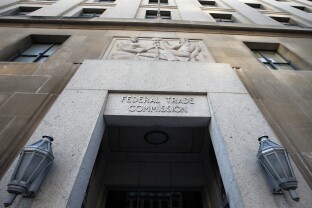Donald Trump’s new pick for Federal Trade Commission chair, current Republican Commissioner Andrew Ferguson, is an ideological wild card.
His stated ideas don’t fall cleanly into the anti-consolidated-corporate-power-on-principle camp, nor does he represent a hard reversion to the more hands-off approach of the FTC of the Reagan era. Some of his proposals are more accurately described as simply Trumpian — more malleable than traditional right, left, free market or populist.
What is clear is that he’s a Trump loyalist with strong ties to the conservative judicial movement.
FTC watchers say Ferguson’s views are likely also tied to his ambitions. One source in the antitrust world described Ferguson to NOTUS as a driven attorney eyeing higher judicial positions in the future, without a clearly settled ideology on corporate power.
“I don’t think that he has a particular set of views that will trump political considerations about his position in the party,” the source said. “If it is politically painful for Donald Trump to be opposed to Big Tech mergers and behavior, then he may find himself easing up on tech.” (Ferguson’s office did not respond to a NOTUS request for comment.)
In his nine months at the FTC thus far, Ferguson has been openly critical of current Chair Lina Khan’s aggressive enforcement strategy. His frequent, dissenting opinions signal a likely shift away from her crackdown on corporate mergers.
But Ferguson has also loudly proclaimed his plans to go after Big Tech and use anti-monopoly laws to fight what he sees as censorship of conservative speech on social media.
“If we’ve got agreement among the platforms to suppress ideas or speech, we have to investigate those for potential antitrust violations,” Ferguson told Steve Bannon’s “War Room” podcast. He later added that he wants to help Trump eliminate the “deep state.”
His pitch for the job appeared tailor-made to fit Trump’s agenda. A document laying out his policy priorities, first reported by Punchbowl News, includes plans to “fight back against the trans agenda” and “investigate and prosecute collusion on DEI” as FTC chair. (His Democratic colleagues criticized the list of priorities after his selection as chair. He responded on X that he is “dedicated to protecting all Americans from monopolists, from fraudsters, and from illegal online censorship.”)
Ferguson’s first move from private practice into politics was clerking for Supreme Court Justice Clarence Thomas. This summer, he told the conservative legal group the Federalist Society he emerged from that clerkship with the conclusion that the two things in politics he cared about most were ending abortion and protecting gun rights. He later went on to work for the Senate Judiciary Committee for Justice Brett Kavanaugh’s confirmation hearing.
More recently, beyond the pitches aligned with Trumpworld goals and his conservative priorities, he has given some recent indications of his broader ideology on corporate power. He espoused an almost progressive-sounding argument for why conservatives shouldn’t cling to free markets as the highest goal of the Federalist Society — despite his frequent pushback against Khan’s approach.
American revolutionaries “weren’t just throwing tea because of the taxes, they hated the monopoly,” he said. Accepting concentrated private power as “results of market forces, let it be,” is “inconsistent with our history, it doesn’t make any sense and if we are being real about being conservatives — that dogmatic view, throw it out the window.”
Ferguson gave another look at how he may run the agency when, last Thursday, the FTC announced a case against an alcohol distributor using a law that hasn’t been enforced since the ’80s that prevents companies from getting special deals competitors can’t. Ferguson dissented, but made clear he did support reviving the law, just not in the case Khan chose — leaving the door open for his own FTC to use niche, abandoned parts of antitrust law for his goals.
House Republican antitrust committee member Rep. Darrell Issa told NOTUS that if Ferguson takes a similar approach as Khan, even on Big Tech — including cracking down on mergers — “I’ll fight him tooth and nail because he’ll be wrong.”
But Issa, like multiple other antitrust committee lawmakers who spoke to NOTUS, admitted he knows very little about Ferguson, adding, “Trump could have picked Satan himself and done better than Lina Khan.”
Democratic Sen. Mazie Hirono, also working on antitrust issues, said she’s always been expecting a Trump loyalist to replace Khan. “I don’t know who that is,” but he “must be 100% loyal to Trump, that’s a pretty good supposition.”
Sen. Mike Lee, the top Senate Republican on antitrust, had been pushing for his former staffer Mark Meador to replace Khan — more aligned with populist, pro-enforcement ideology — or current Republican Commissioner Melissa Holyoak, who has espoused a more hands-off enforcement approach for the top spot. But after the announcement he told NOTUS that he likes Ferguson, too, and was pleased Meador was also still nominated to the commission by Trump.
Ferguson is well-known among some other Republicans in judicial circles. His former boss on the Senate Judiciary Committee, Sen. Chuck Grassley — not particularly involved in antitrust issues — told NOTUS he “sent a signal” to Trump’s team that Ferguson “ought to have that job.”
But what he’ll do with the job now that he has it is an open question hinging on the “live debate” in the Republican Party and Trumpworld (that now includes Elon Musk) about how much government interference there should be in tech companies’ business.
“Whoever wins out on that argument will be influential over Ferguson’s enforcement strategy,” the antitrust source said.
—
Claire Heddles is a NOTUS reporter and an Allbritton Journalism Institute fellow.
Sign in
Log into your free account with your email. Don’t have one?
Check your email for a one-time code.
We sent a 4-digit code to . Enter the pin to confirm your account.
New code will be available in 1:00
Let’s try this again.
We encountered an error with the passcode sent to . Please reenter your email.


